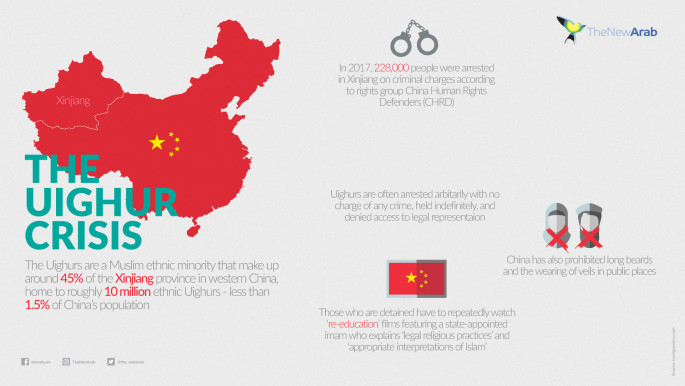China 'may use' coronavirus as cover for Uighur deaths in internment camps
Uighur activist Bahram K. Sintash told Metro that the fate of his father, journalist Qurban Mamut, who was taken to one of camps in 2018 remains unknown, and that he fears authorities will use the coronavirus spread to cover up his death.
Sintash, who lives in the US, has been unable to speak with his father for two years, after the Chinese government cut off all communication from the camps.
"All Uighurs, especially people like me who have family members in camps, are worried," Sintash says. "To me, this new virus seems to justify killing some of the detainees in the camp so they can say 'it wasn't us, it's the disease that's killing people'.
"I fear this is what's happening, I'm scared they're using it to justify their crimes in there," Sintash added. "The international media needs to pay more attention to the concentration camps. So much of the media is reporting on the coronavirus but they're forgetting about the Uighurs."
Twitter Post
|
Sintash also voiced concern over the lack of government plans to counter the virus if it spreads in the camps, and questioned why the camps are allowed to continue to operate.
"People in there could easily die [from coronavirus]," he said. "If anyone was in my situation, they wouldn't stop and accept reality.
"If my father died in normal circumstances, I could feel like he had passed away and I loved him, but he was gone. But I cannot stop my activism, I don't know if he's alive or dead. I think about it every day."
Similarly, Kanbinuer Aini, who lives outside China, is worried about the fate of her sister who was taken in 2016, when authorities in China told her that her family was selected for a three-month "re-education" programme.
Aini believes that her sister Renaguli Aini, a well-educated mother-of-two, is still in the camps, but there has been no information over her fate. Aini fears that the government will pin her sister's death on the coronavirus.
"I hope the Chinese government would not do it intentionally," she told Metro. "I'm worried they will kill the people in the camps and then they will just use the excuse that they've died of the virus.
"We think about this constantly. I hope the United Nations can do something. In my every breath, I feel guilty for my sister," she says.
 |
The international media needs to pay more attention to the concentration camps. So much of the media is reporting on the coronavirus but they're forgetting about the Uighurs - Bahram K. Sintash, Uighur activist |
 |
"They can't forget this ethnic cleansing. Concentration camps were happening last century and people say 'we'll never let it happen again'. I don't know why international societies just seem to be in silence."
 |
| [Click to enlarge] |
China initially denied the network of internment camps existed but changed its position recently to say they are vocational schools that combat Islamist extremism through education and training.
Authorities rebuked international criticism by repeatedly asserting that "Xinjiang affairs are purely China's internal affairs".
Activists have urged authorities to allow an international inspection of the camps, which are now seen as vulnerable amid the outbreak of the deadly coronavirus.
The are around one million ethnic Uighurs and other Muslim minorities being held in overcrowded camps operated by the Xinjiang Uighurs Autonomous Region government to indoctrinate Uighurs since 2017.
The camps were established under General Secretary Xi Jinping's administration and led by hardline party secretary, Chen Quanguo.
Meanwhile, millions of Chinese continue to live under strict quarantine in Wuhan, the epicentre of the virus, and nearby cities after authorities in Beijing finally acknowledged the breakout of the coronavirus.
Follow us on Twitter and Instagram to stay connected

![Thousands gather in front of the Cannon House Office Building and the US Capitol to demand the US pressure Israel on a ceasefire in its conflict with Gaza. [Brooke Anderson/The New Arab]](/sites/default/files/styles/image_330x185/public/2023-10/393387495_710301464290105_8375393679399060035_n.jpg?h=ff8c3fa3&itok=WdtyAWP_)

